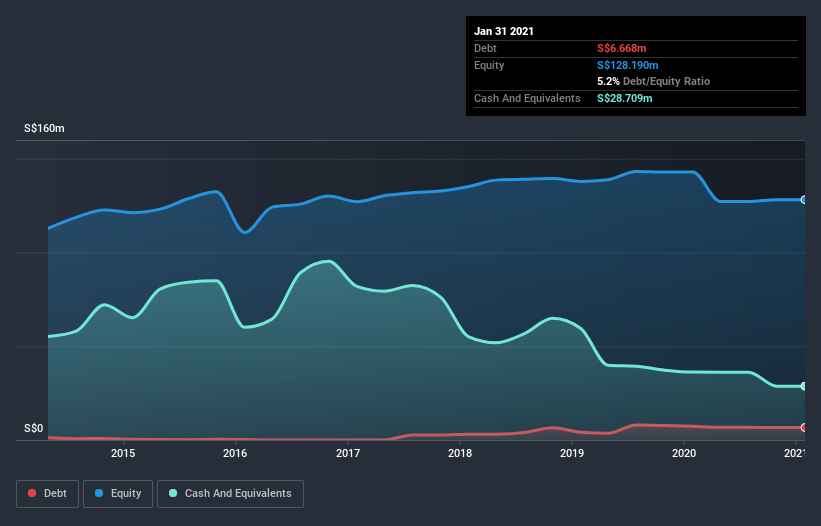The external fund manager backed by Berkshire Hathaway's Charlie Munger, Li Lu, makes no bones about it when he says 'The biggest investment risk is not the volatility of prices, but whether you will suffer a permanent loss of capital.' So it might be obvious that you need to consider debt, when you think about how risky any given stock is, because too much debt can sink a company. We can see that T T J Holdings Limited (SGX:K1Q) does use debt in its business. But should shareholders be worried about its use of debt?
Why Does Debt Bring Risk?
Debt assists a business until the business has trouble paying it off, either with new capital or with free cash flow. Ultimately, if the company can't fulfill its legal obligations to repay debt, shareholders could walk away with nothing. While that is not too common, we often do see indebted companies permanently diluting shareholders because lenders force them to raise capital at a distressed price. Of course, the upside of debt is that it often represents cheap capital, especially when it replaces dilution in a company with the ability to reinvest at high rates of return. The first step when considering a company's debt levels is to consider its cash and debt together.
View our latest analysis for T T J Holdings
What Is T T J Holdings's Net Debt?
As you can see below, T T J Holdings had S$6.67m of debt at January 2021, down from S$7.31m a year prior. However, its balance sheet shows it holds S$28.7m in cash, so it actually has S$22.0m net cash.

How Healthy Is T T J Holdings' Balance Sheet?
We can see from the most recent balance sheet that T T J Holdings had liabilities of S$14.0m falling due within a year, and liabilities of S$14.8m due beyond that. Offsetting these obligations, it had cash of S$28.7m as well as receivables valued at S$52.6m due within 12 months. So it can boast S$52.5m more liquid assets than total liabilities.
This excess liquidity is a great indication that T T J Holdings' balance sheet is almost as strong as Fort Knox. On this view, lenders should feel as safe as the beloved of a black-belt karate master. Simply put, the fact that T T J Holdings has more cash than debt is arguably a good indication that it can manage its debt safely. There's no doubt that we learn most about debt from the balance sheet. But you can't view debt in total isolation; since T T J Holdings will need earnings to service that debt. So if you're keen to discover more about its earnings, it might be worth checking out this graph of its long term earnings trend.
Over 12 months, T T J Holdings made a loss at the EBIT level, and saw its revenue drop to S$58m, which is a fall of 31%. To be frank that doesn't bode well.
So How Risky Is T T J Holdings?
We have no doubt that loss making companies are, in general, riskier than profitable ones. And in the last year T T J Holdings had an earnings before interest and tax (EBIT) loss, truth be told. Indeed, in that time it burnt through S$3.6m of cash and made a loss of S$11m. Given it only has net cash of S$22.0m, the company may need to raise more capital if it doesn't reach break-even soon. Even though its balance sheet seems sufficiently liquid, debt always makes us a little nervous if a company doesn't produce free cash flow regularly. The balance sheet is clearly the area to focus on when you are analysing debt. But ultimately, every company can contain risks that exist outside of the balance sheet. For example, we've discovered 3 warning signs for T T J Holdings (1 makes us a bit uncomfortable!) that you should be aware of before investing here.
Of course, if you're the type of investor who prefers buying stocks without the burden of debt, then don't hesitate to discover our exclusive list of net cash growth stocks, today.
If you’re looking to trade T T J Holdings, open an account with the lowest-cost* platform trusted by professionals, Interactive Brokers. Their clients from over 200 countries and territories trade stocks, options, futures, forex, bonds and funds worldwide from a single integrated account. Promoted
Valuation is complex, but we're here to simplify it.
Discover if T T J Holdings might be undervalued or overvalued with our detailed analysis, featuring fair value estimates, potential risks, dividends, insider trades, and its financial condition.
Access Free AnalysisThis article by Simply Wall St is general in nature. It does not constitute a recommendation to buy or sell any stock, and does not take account of your objectives, or your financial situation. We aim to bring you long-term focused analysis driven by fundamental data. Note that our analysis may not factor in the latest price-sensitive company announcements or qualitative material. Simply Wall St has no position in any stocks mentioned.
*Interactive Brokers Rated Lowest Cost Broker by StockBrokers.com Annual Online Review 2020
Have feedback on this article? Concerned about the content? Get in touch with us directly. Alternatively, email editorial-team (at) simplywallst.com.
About SGX:K1Q
T T J Holdings
T T J Holdings Limited, an investment holding company, engages in the design, supply, fabrication, and erection of various structural steel works in Singapore, Malaysia, and Thailand.
Flawless balance sheet second-rate dividend payer.
Market Insights
Community Narratives



